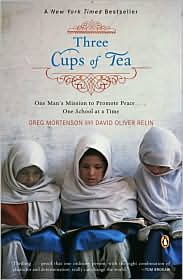 My book club selection this month was Three Cups of Tea: One Man's Mission to Promote Peace. . .One School at a Time.
My book club selection this month was Three Cups of Tea: One Man's Mission to Promote Peace. . .One School at a Time.The book description sounded inspiring, but I didn't realize there would be more to it than just Greg Mortenson's life story. The book also told the story of a volatile region whose history I know little about.
I had a hard time getting into the beginning of the book, which tells about Mortenson's failed attempt to reach the summit of K2 and his first introduction to the small village where the first school was evetually built. This section included a bunch of quotes from books about climbing and other famous climbers, but instead of giving me more information about what the climbing experience is actually like, it took me out of the more personal story by taking away from Mortenson's own perspective.
I did really enjoy how later parts of the book kept track of individuals who benefitted from being able to attend the schools--especially how they returned to their communities and passed along their knowledge or expertise. I was surprised that the small communities were so eager to educate their girls, since my (stereotypical) first thought was that the culture of the area was oppressive to women and denied them many things I take for granted. I would love to read a sequel about how educated females in these communities have positively affected the region in the long term.
From Publisher's Weekly:
Some failures lead to phenomenal successes, and this American nurse's unsuccessful attempt to climb K2, the world's second tallest mountain, is one of them. Dangerously ill when he finished his climb in 1993, Mortenson was sheltered for seven weeks by the small Pakistani village of Korphe; in return, he promised to build the impoverished town's first school, a project that grew into the Central Asia Institute, which has since constructed more than 50 schools across rural Pakistan and Afghanistan. Coauthor Relin recounts Mortenson's efforts in fascinating detail, presenting compelling portraits of the village elders, con artists, philanthropists, mujahideen, Taliban officials, ambitious school girls and upright Muslims Mortenson met along the way. As the book moves into the post-9/11 world, Mortenson and Relin argue that the United States must fight Islamic extremism in the region through collaborative efforts to alleviate poverty and improve access to education, especially for girls. Captivating and suspenseful, with engrossing accounts of both hostilities and unlikely friendships, this book will win many readers' hearts.
No comments:
Post a Comment